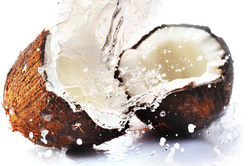 Lisa Donaldson APD Facebook went nuts this week with a battle over coconut oil spurred on by Chef Pete Evans. The Paleo community was cheering for its benefits, while the Dietitians Association of Australia warned of the high levels of saturated fat. As a dietitian who promotes ‘eating close to nature’, I thought I’d sit down this week and wade through the science and research to find some sort of common ground. Firstly, let’s take a closer look at this supposed ‘bad guy’ known as saturated fat. Coconut oil is about 90% saturated fat, which is a higher percentage than butter (64% saturated fat), beef fat or lard (40%). Typically, too much saturated fat in the diet is unhealthy because it raises 'bad' LDL cholesterol levels, which unfortunately increases the risk of heart disease. BUT that’s where we need to stop and reconsider grouping all saturated fats together, because we need to acknowledge that not all saturated fats are the same. What's distinctive about coconut oil is that it also gives rise to the good HDL cholesterol. Coconut oil is extremely rich in a saturated fat called lauric acid. Unlike the longer chain saturated fats, lauric acid has a positive effect on blood cholesterol profiles. Coconut oil also has small levels of medium-chain saturated fats and the body is able to breakdown these fats as fuel more easily than long chain saturated fats. BUT does that make it OK to add spoonfuls to your smoothies or to deep-fry your potato chips in it? Put simply, is coconut oil some sort of fat-burning superfood? No. What we need to keep in mind is that coconut oil, like any other fat, is extremely high in calories. Along with high energy levels, there are virtually no vitamins and minerals in coconut oil and the antioxidant compounds are inferior to the levels you would find in extra virgin olive oil. In terms of research, there are no long-term population studies to examine its effect on cholesterol levels over time, nor is there solid evidence to explain how coconut oil affects heart health/disease. At this time, the lack of research and the current science fails to convince me it is a ‘superfood’. Sure, coconut oil's distinctive HDL boosting effect certainly makes it a better choice than butter or lard, but it’s still not the best choice amongst a range of oils that have been proven to reduce the risk of heart disease. If you love how it makes your Asian dishes taste or how it works in raw fudge, have a little for that delicious flavor. What you need to keep in mind is that it’s not a miraculous cure for your heart, nor is it going to get you lean. It is however delicious and should be consumed in sensible portions and be neither revered or feared. My final recommendation? Eat your coconut as a whole food, enjoy the taste and gain benefit from the awesome fibre it contains… As for the oil, use small amounts for the flavor rather than the health benefits.
0 Comments
 By Jenelle Croatto APD Living with an unhappy gut can be uncomfortable and tiring to manage. Here at FEEDinc we regularly help our clients with various gut issues, whether that be an irritable bowel or helping your get rid of that “heavy feeling” that many people complain of. There is much you can do to keep your gut in its best health. Take a look at some of the follows factors that can help improve your gut health today. FIBRE · INSOLUBLE FIBRE – Well known for its ability in keeping you ‘regular’, insoluble fibre is found in the fibrous parts of fruits and vegetables and outer husks of grains – think roughage. Acting like a broom, insoluble fibre helps move things along in the bowel. Refined and processed grains such as white rice and white flour will be low in insoluble fibre as the outer husk of the grains have been removed. · SOLUBLE FIBRE – As suggested by the name this type of fibre is in part soluble and forms a type of gel in the gut which has been shown to benefit our health in a couple of ways. Firstly, soluble fibre slows down the absorption of carbohydrate from our food which in turn results in a slower release of energy to the blood stream. Unsurprisingly foods that are higher in soluble fibre tend to have a lower glycaemia index (GI), which is simply a measure of how long it takes for the carbohydrate within a food to be broken down to glucose. Secondly, soluble fibre has a powerful ability to lower cholesterol. It does this by binding itself with cholesterol in food and bile salts (building block of cholesterol) and in turn prevents cholesterol from being absorbed and manufactured in the body. · RESISTANT STARCH – acts as a prebiotic within the gut which encourages the growth of healthy and beneficial bacteria in the bowel. HOW MUCH DO I NEED? 25g fibre/day – adult women 30g fibre/day – adult men When reading food labels opt for fibre containing products (cereals, breads, muesli bars etc) which have at least 3g fibre/serve. CONSIDER PROBIOTICS Did you know that the digestive system is home for more than 100 trillion bacteria and over 100 different types of bacteria? For good health is pays to have the right balance between good and not so good bacterial residents in our gut. Diet, stress, alcohol, antibiotics and other drugs are known to affect this balance. Probiotics are healthy bacteria which can be found in yoghurts, fermented foods such as sauerkraut (fermented cabbage), kefir (fermented yoghurt drink) and can help to keep this balance. Probiotics can also be taken as a supplement or in a probiotic drink such as Yalkult. For most people this balance is maintained by eating a variety of healthy fibre-rich foods and as mentioned above, foods that act as prebiotics support the growth of beneficial bacteria. Such foods include, fruit & vegetables, wholegrains & cereals and legumes & lentils. Did you know...? Some people who suffer from lactose intolerance claim to better tolerate yoghurt over other dairy products such as milk. This is because the bacteria within the yoghurt have already partially ‘digested’ the lactose found within the yoghurt which means less lactose for your body to digest. KEEP ACTIVE & STAY HYDRATED Keeping your fluids up and leading an active lifestyle will help to keep your bowels regular. Activity stimulates our bowel to move and when teamed with adequate hydration can significantly help those who are afflicted with constipation. Adults are encourage to consume around 2 – 3 litres of fluid each day, with water being a major contributor to our total fluid intake. Although caffeinated beverages such as tea and coffee can have a diuretic effect they still contribute to the total amount of fluid consumed. The only fluid that doesn’t contribute to your hydration status is alcohol as it has a particularly dehydrating affect on the body. BE CAREFUL OF FAD DIETS Today there seems to be a new diet touted for its weight loss and slimming effects with every passing month. Be careful of such diets, particularly those that cut out entire food groups, as they are often low in fibre and a one stop shop for a sluggish gut and constipation! Not to mention nutritionally lacking and unsatisfying to adhere by. DO YOU HAVE AN IRRITABLE BOWEL? To those who suffer from an irritable bowel, it is well known how much of a disturbance this can have on your quality of life and general comfort. The symptoms of irritable bowel may seem to come and go and it can be difficult to pinpoint what your triggers are. What affects one person may not affect another. Common trigger includes stress, diet, caffeine/alcohol/smoking, medications and/or illness. Common symptoms of an irritable bowel include - Alternating bowel patterns – diarrhoea/constipation - Frequent bloating and flatulence - Abdominal discomfort You needn’t live with an irritable bowel. Speak with your doctor about how to best manage this. If diet is a trigger for you then a dietitian can help work out what your intolerances may be and can provide recommendations on how to eat to best manage such intolerances. |
News FEEDFitness, Energy, Education & Diet Archives
June 2020
Categories
All
|
 RSS Feed
RSS Feed